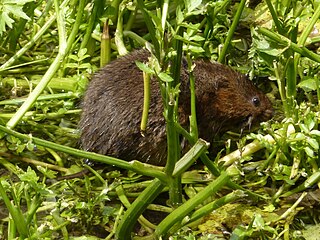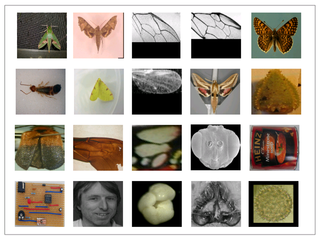Related Research Articles

The Convention on Biological Diversity (CBD), known informally as the Biodiversity Convention, is a multilateral treaty. The convention has three main goals: the conservation of biological diversity ; the sustainable use of its components; and the fair and equitable sharing of benefits arising from genetic resources. Its objective is to develop national strategies for the conservation and sustainable use of biological diversity, and it is often seen as the key document regarding sustainable development.

The International Union for Conservation of Nature is an international organization working in the field of nature conservation and sustainable use of natural resources. It is involved in data gathering and analysis, research, field projects, advocacy, and education. IUCN's mission is to "influence, encourage and assist societies throughout the world to conserve nature and to ensure that any use of natural resources is equitable and ecologically sustainable".

The Ramsar Convention on Wetlands of International Importance Especially as Waterfowl Habitat is an international treaty for the conservation and sustainable use of wetlands. It is also known as the Convention on Wetlands. It is named after the city of Ramsar in Iran, where the convention was signed in 1971.
Diversitas was an international research programme aiming at integrating biodiversity science for human well-being. In December 2014 its work was transferred to the programme called Future Earth, which was sponsored by the Science and Technology Alliance for Global Sustainability, comprising the International Council for Science (ICSU), the International Social Science Council (ISSC), the Belmont Forum of funding agencies, the United Nations Educational, Scientific, and Cultural Organization (UNESCO), the United Nations Environment Programme (UNEP), the United Nations University (UNU) and the World Meteorological Organization (WMO).

The Global Environment Facility (GEF) was established on the eve of the 1992 Rio Earth Summit to help tackle our planet's most pressing environmental problems. The GEF unites 184 countries in partnership with international institutions, civil society organizations (CSOs), and the private sector to address global environmental issues while supporting national sustainable development initiatives. Since 1992, the GEF has provided close to $20.5 billion in grants and mobilized an additional $112 billion in co-financing for more than 4,800 projects in 170 countries. Through its Small Grants Programme (SGP), the GEF has provided support to nearly 24,000 civil society and community initiatives in 133 countries.

The International Union of Biological Sciences (IUBS) is a non-profit organization and non-governmental organization, founded in 1919, that promotes the biological sciences internationally. As a scientific umbrella organization it was a founding member of the International Council for Science (ICSU).

The United Kingdom Biodiversity Action Plan or (UK BAP) was the UK government's response to the Convention on Biological Diversity, opened for signature at the Rio Earth Summit in 1992. The UK was the first country to produce a national Biodiversity Action Plan. It was published in 1994 and created action plans for priority species and habitats in the UK that were most under threat so as to support their recovery.
The 2010 Biodiversity Target was an overall conservation target aiming to halt the decline of biodiversity by the end of 2010. The world largely failed to meet the target.

A biodiversity action plan (BAP) is an internationally recognized program addressing threatened species and habitats and is designed to protect and restore biological systems. The original impetus for these plans derives from the 1992 Convention on Biological Diversity (CBD). As of 2009, 191 countries have ratified the CBD, but only a fraction of these have developed substantive BAP documents.
The Bat Conservation Trust (BCT) is a registered British charity dedicated to the conservation of bats and their habitats in the UK. BCT was founded in 1991 and is the only national organisation solely devoted to bats. Its vision is a world where bats and people live in harmony. BCT currently has a membership of around 5,600, including individuals, families, teachers and youth workers and corporate businesses.

The Biodiversity Indicators Partnership (BIP) brings together a host of international organizations working on indicator development, to provide the best available information on biodiversity trends to the global community. The Partnership was initially established to help monitor progress towards the Convention on Biological Diversity (CBD) 2010 Biodiversity target. However, since its establishment in 2006 the BIP has developed a strong identity not only within the CBD but with other Multilateral Environmental Agreements (MEAs), national and regional governments and other sectors. As a result, the Partnership will continue through international collaboration and cooperation to provide biodiversity indicator information and trends into the future.

The Economics of Ecosystems and Biodiversity (TEEB) was a study led by Pavan Sukhdev from 2007 to 2011. It is an international initiative to draw attention to the global economic benefits of biodiversity. Its objective is to highlight the growing cost of biodiversity loss and ecosystem degradation and to draw together expertise from the fields of science, economics and policy to enable practical actions. TEEB aims to assess, communicate and mainstream the urgency of actions through its five deliverables—D0: science and economic foundations, policy costs and costs of inaction, D1: policy opportunities for national and international policy-makers, D2: decision support for local administrators, D3: business risks, opportunities and metrics and D4: citizen and consumer ownership.

The European Centre for Nature Conservation (ECNC) was a Dutch non-profit foundation which was active in the field of European nature and biodiversity policy between 1993 and 2017. It was set up as a network of university departments, expert centres and government agencies and operated as a European biodiversity expertise centre. The organization promoted sustainable management of natural resources and biodiversity, and aimed to stimulate interaction between science, society and policy.
Following the 2010 United Kingdom general election, the UK Government announced plans to curb public spending through the abolition of a large number of quasi-autonomous non-governmental organisations (quangos). On 23 May 2010, Chancellor of the Exchequer George Osborne unveiled a £500million plan to reduce the budget deficit by abolishing or merging many quangos. This was styled in the national press as a "bonfire of the quangos", making reference to Girolamo Savonarola's religiously inspired Bonfire of the Vanities. The cuts and closures received criticism in some quarters, but was generally welcomed by the business community.

Digital automated identification system (DAISY) is an automated species identification system optimised for the rapid screening of invertebrates by non-experts.
The United Nations General Assembly declared 2011–20 the United Nations Decade on Biodiversity. The UN Decade on Biodiversity serves to support and promote implementation of the objectives of the Strategic Plan for Biodiversity and the Aichi Biodiversity Targets, with the goal of significantly reducing biodiversity loss.
The Green Development Initiative (GDI) aims to establish a new marketplace for sustainable landscape management. As a key first step it has established a Platform for Verified Conservation Areas (VCAs) which includes an online Registry, a Standard and a Toolkit The Standard is based on the objectives and approaches of the Convention on Biological Diversity (CBD).
The Scientific and Technical Advisory Panel (STAP) is an independent advisory body established by the United Nations Global Environment Facility (GEF) in 1995. Seven expert advisers provide the GEF with up to date, authoritative and globally representative science in the areas of biological diversity, climate change, desertification and persistent organic pollutants.

Tan Sri Zakri bin Abdul Hamid has had a distinguished career in science as a researcher, educator, administrator and diplomat.
The Biological Diversity Act, 2002 is an Act enacted by the Parliament of India for the preservation of biological diversity in India, and provides mechanism for equitable sharing of benefits arising out of the use of traditional biological resources and knowledge. The Act was enacted to meet the obligations under the Convention on Biological Diversity (CBD), because India is a party of the convention {meeting}.
References
- ↑ "House of Commons Written Answers - Environment, Food and Rural Affairs". Hansard . UK Parliament. 13 December 2010. Archived from the original on 22 November 2011. Retrieved 15 December 2010.
- ↑ "Honorary degrees". The University of St Andrews. 11 June 2002. Archived from the original on 20 June 2012. Retrieved 15 December 2010.
- 1 2 "Society Maritime Industries : News" . Retrieved 15 December 2010.
- 1 2 "Darwin Advisory Committee". Darwin Initiative. DEFRA . Retrieved 15 December 2010.
- ↑ "Bonfire of the quangos: bodies to be abolished". The Independent. London. 15 October 2010. Retrieved 15 December 2010.